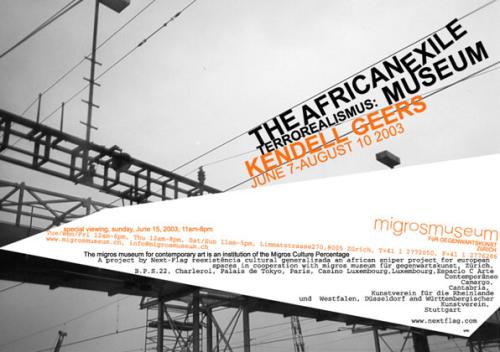Kendell Geers
dal 5/6/2003 al 10/8/2003
Segnalato da
5/6/2003
Kendell Geers
Migros Museum, Zurich
In his work Kendell Geers constructs simple, poetic situations in which a destabilising and often violent moment is inherent, and which in their direct confrontation challenge observers to position themselves, to 'relate themselves' to them. The room-filling installations are characterised equally by antagonism and the attempt to acquire the conceptual tradition of the modern.

TERROREALISMUS
In his work Kendell Geers constructs simple, poetic situations in which a
destabilising and often violent moment is inherent, and which in their direct
confrontation challenge observers to position themselves, to "relate themselves"
to them. The room-filling installations are characterised equally by antagonism
and the attempt to acquire the conceptual tradition of the modern.
Since the end of the 1980s, Kendell Geers has been working on a linking of
conceptual and political approaches, but without the self-conception of a
political artist. Politics here must be seen as everyday politics, denoting
those decisions that are made day by day in order to live and survive. Politics
is both an element of his art and of his life, and it is his answer to the cold
conceptualism of the 1970s.
The Migros Museum for Contemporary Art in Zurich is showing the work
TERROREALISM, which has been specially designed for the museum. TERROREALISM is
cell, prison and temple, all at the same time. The outer façade, pierced by
pieces of broken glass, blocks any view of the interior - it is impossible to
fathom whether knowledge of this interior signifies a threat or protection. Only
upon entering the room do three neon tubes become visible, forming the words
BORDER, DANGER and TERROR. A physical error causes a semantic short-circuit
which allows new levels of meaning to arise, which designates and simultaneously
negates cause and effect. The same subtle sense of humour which transforms the
fragments-concrete combination into a room-filling sculpture, also characterises
the new word constellation ORDER, ANGER and ERROR. That too is a possible answer
to systems and their attributions.
This exhibition is part of the project "NEXT FLAG - an African sniper project
for European spaces"
Cooperation partners: Migros Museum for Contemporary Art, Zurich - B.P.S.22
Espace de Création Contemporaine, Charleroi - Casino Luxembourg Forum d'Art
Contemporain, Luxembourg - Palais de Tokyo Site de création contemporaine,
Paris - Espacio C Arte Contemporáneo, Camargo Cantabria - Württembergischer
Kunstverein, Stuttgart - Kunstverein für die Rheinlande und Westfalen,
Düsseldorf.
Press Conference: 6 June 2003, 11.30 a.m.
Special Viewing: 15 June 2003, 11 a.m. - 8 p.m.
________
THE AFRICAN EXILE MUSEUM
Willem Boshoff - Lisa Brice - Loulou Cherinet - Soly Cisse - Kendell Geers - Kay
Hassan - William Kentridge - Moshekwa Langa - Toma Luntumbue - Zwelethu Mthethwa
- Nx{00B4}Dilo Mutima - Aimé Ntakiyica - Olu Oguibe - Tracey Rose - Berni Searle -
Yinka Shonibare - Minette Vári
"The African Exile Museum" is a mobile exhibition platform for contemporary
African art. Eighteen artistic positions tell a story about the social changes
that are currently taking place on the African continent. It concerns questions
of multiple identities, of the close interweaving of urbanity and the collapse
of social systems as well as the personal stories about them.
At the beginning of the 20th century, aesthetic revolutions occurred with the
Dadaist and Surrealist movements. For their strategic actions the poet Léopold
Sédar Senghor coined the term "franc-tireurs entrenched behind the enemy" -
those who as vanguard start a new world order on unsecured ground. The
initiators of "NEXT FLAG - an African sniper project for European spaces" use
this image of Senghor's franc-tireurs in order to express their desire for a new
artistic and social space. That the initiators are Africans is due to the
Marxist concept of historical materialism. This states that no changes of
circumstances can be derived from those who have profited from the contrasts of
this world. In an act of post-postcolonial occupation, NEXT FLAG has made it its
aim to represent contemporary African art in European exhibition rooms. The
project thus makes the attempt to bring together existing contradictions under a
new - the next - flag, not in the sense of unity but as the establishment of a
new, emotional geography, detached from physical actuality.
The "The African Exile Museum" exhibition at the Migros Museum for Contemporary
Art in Zurich is part of the project "NEXT FLAG - an African sniper project for
European spaces". It is the result of collaboration between the initiators of
NEXT FLAG - Fernando Alvim and Simon Njami - and Heike Munder.
Cooperation partners: Migros Museum for Contemporary Art, Zurich - B.P.S.22
Espace de Création Contemporaine, Charleroi - Casino Luxembourg Forum d'Art
Contemporain, Luxembourg - Palais de Tokyo Site de création contemporaine,
Paris - Espacio C Arte Contemporáneo, Camargo Cantabria - Württembergischer
Kunstverein, Stuttgart - Kunstverein für die Rheinlande und Westfalen,
Düsseldorf.
The following collections are participating in the exhibition in the Migros
Museum for Contemporary Art:
Hans Bogatzke's collection of African contemporary art, Germany
Costa Reis compilação de arte africana actual, Angola
Espacio C Collection, Camargo, Cantabria, Spain.
The Migros Museum for Contemporary Art is an institution of the Migros Cultural
Percentage.
Tue/Wed/Fri 12 noon - 6 p.m.
new: Thurs 12 noon - 8 p.m.
Sat/Sun 11 a.m. - 5 p.m.
Migros museum
Limmatstr. 270
Zurich



